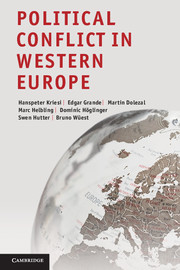Book contents
- Frontmatter
- Contents
- List of Figures
- List of Tables
- Preface and acknowledgments
- Part I Theory and methods
- Part II The development of the ‘integration–demarcation’ cleavage
- 3 Participation and party choice: comparing the demand side of the new cleavage across arenas
- 4 Restructuring the national political space: the supply side of national electoral politics
- 5 Restructuring the European political space: the supply side of European electoral politics
- 6 Restructuring protest politics: the terrain of cultural winners
- 7 Congruence, counterweight, or different logics? Comparing electoral and protest politics
- Part III Public debates: the articulation of the new cleavage in detail
- Part IV Conclusion
- References
- Index
5 - Restructuring the European political space: the supply side of European electoral politics
Published online by Cambridge University Press: 05 August 2012
- Frontmatter
- Contents
- List of Figures
- List of Tables
- Preface and acknowledgments
- Part I Theory and methods
- Part II The development of the ‘integration–demarcation’ cleavage
- 3 Participation and party choice: comparing the demand side of the new cleavage across arenas
- 4 Restructuring the national political space: the supply side of national electoral politics
- 5 Restructuring the European political space: the supply side of European electoral politics
- 6 Restructuring protest politics: the terrain of cultural winners
- 7 Congruence, counterweight, or different logics? Comparing electoral and protest politics
- Part III Public debates: the articulation of the new cleavage in detail
- Part IV Conclusion
- References
- Index
Summary
Introduction
National elections, which were explored in Chapter 4, remain the most important arena for the mobilization of conflict in contemporary European societies. As part of the political aspect of globalization, however, European citizens increasingly face a complex system of multi-level governance, especially with respect to European integration, so we have incorporated elections to the European Parliament (EP) into our analysis. The question we seek an answer to in this chapter is whether these elections resemble national contests or whether they correspond to forms of Europeanization. These two different characteristics directly refer to the discussion in Chapter 1 where various forms of transnational mobilization were identified (see Table 1.1).
The nation state remains the fundamental guarantor of democracy and freedom in the twenty-first century (Cerny 1999; Dahl 2000) but for citizens in EU member states, EP elections are the most important form of institutionalized political participation beyond it. EP elections were first held in 1979, at a time when this institution played an insignificant role in what was then the European Community. Since then, these elections have become increasingly important, as the EP itself has been given increasing power (Rittberger 2005). Because the Treaty of Lisbon finally came into force on 1 December 2009, the EP could become even more important as the co-decision procedure, which gives it equal power to the council, is now the standard method of legislation in the EU (Hofmann and Wessels 2008: 12).
- Type
- Chapter
- Information
- Political Conflict in Western Europe , pp. 127 - 150Publisher: Cambridge University PressPrint publication year: 2012
- 9
- Cited by



